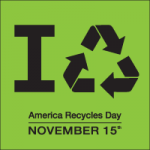America Recycles Day is November 15 (that’s this Thursday)! Every year, one nationally recognized day is set aside to bring the country together for a day to encourage, educate, and celebrate recycling. Events are held all over the country, usually at schools or community centers. Local organizations are the biggest participants in ARD. Event attendees are often asked to sign pledges dedicated to recycling more and to buy products made from recycled materials. Arguably recycling is the most common form of environmental responsibility, and events like this keep people educated on recycling updates in their communities and keep up recycling enthusiasm.
America Recycles day is a program of the non-profit Keep America Beautiful since 2009. They provide promotional support and provide resources to local event organizers. Financial sponsors of ARD are in the private and public sectors, and the EPA is an especially large partner.
Here on campus, student groups are mobilizing to get the word out about recycling. GreenSpace is hosting Recycle the Runway for a second year. Student groups create costumes out of used materials and demonstrate the creative ways discarded plastic, bottles, cans, utensils – anything – can be reused. Recycle the Runway will be at Thursday November 15 at 7 pm in the Interfaith Chapel. There will be prizes!
If you are unable to attend an ARD event (and they are scarce in Rochester) you can take the pledge here! Happy recycling!
By Alanna Scheinerman, Class of 2013




“Arguably recycling is the most common and transparent form of environmental responsibility”
It is surely transparent. But responsible? It surely depends on what we are recycling and in what settings. Old lead-acid batteries? Indeed a good idea. Valuable metal and other building materials? Indeed a good idea. And of course we should already know this because the private sector already recycles most of the most important resources already – and its volume of recycled materials well exceeds that from public rubbish recycling efforts.
Mandatory curbside recycling of rubbish like glass, plastic, paper and cans? Not such a good idea – unless wasting resources is the goal. Several questions, again which I am hesitant to ask about lest I be told I am being paid by Exxon to ask them, and must really want to see the world destroyed to boot (gosh I must really hate our two children). There is research available on all of these:
(1) If recycling is so valuable, and saves resources, wouldn’t we expect the poorest communities and countries to be more heavily engaged in it? What do the data actually show? Are the poorest countries most likely to recycle? After all, that should be a free lunch for them? Their labor is cheap. Their energy and water use is subsidized, so at least it is cheap at the user end. And they need wealth.
(2) Has anyone addressed the research on what goals recycling is supposed to achieve versus what it does?
Is landfill space (even regionally) a problem, particularly if we can trade in trash?
Is trash hazardous (we are not talking about lead-acid batteries (but what about those CFC light bulbs?), but rather the paper, plastic, cans that are the focus of most recycling programs?
How actually dangerous are landfills for groundwater (the EPA has research)? How dangerous are they for air quality?
How likely are landfills to cause cancer as compared to other carcinogens?
Does packaging mean that too much trash necessarily ends up in landfills or the oceans?
Does packaging possible conserve on other more valuable resources?
Has packaging become more or less prevalent and why?
Are we at any risk of running out of aluminum, paper, or plastic? And if so, what’s so bad about concentrating all of these “valuable” resources in existing landfills to be mined later on when they become more valuable?
Does recycling beat the relevant alternatives in terms of generating pollution (after all, it is a manufacturing process)?
Are things like ceramic and reusable coffee mugs “better” for the environment than styrofoam or paper cups or plastic water bottles? How do we know? What if we only care about water quality? Or air quality? Or energy use? Is it clear that reusables are “better” on all of these measures?
What does it cost to prevent litter using recycling as compared to other methods of preventing litter?
If you use the pricing system and also do a good job measuring the potential “negative externalities” of each of the production processes, how does recycling stack up against traditional disposal of MSW? What does it cost to collect and process a ton of recyclables? How much value can a ton of recyclables generate? How do these compare to the dumping fees and collection and transportation of “regular” trash?
What does environmental responsibility mean? I offer up that it can only mean that we bear 100% of the costs of our actions, always and everywhere. Is recycling the way to get there?
“events like this keep people educated on recycling updates in their communities and keep up recycling enthusiasm”
So, if I go to one of these events, will I be able to learn the answers to these kinds of questions? Or are they not really about education? Thank you for your time.